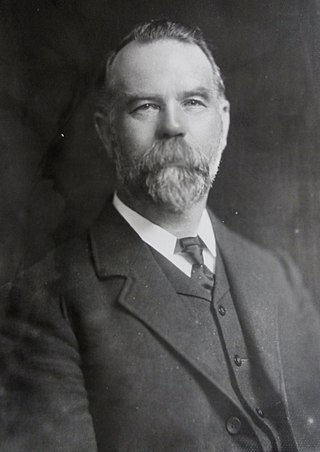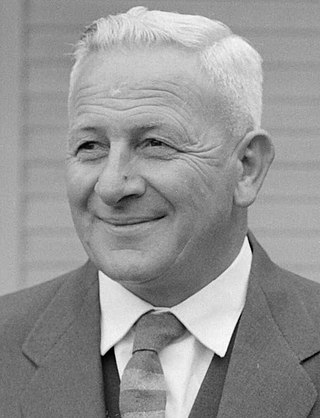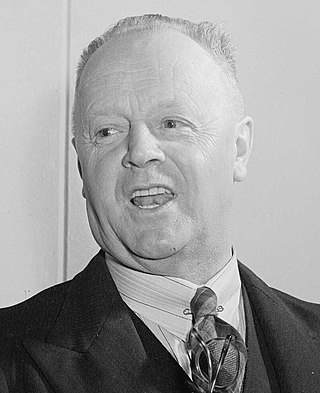
Sir Francis Joseph Kitts was a New Zealand politician. Originally from the South Island, he served in the military and later was a civil servant before entering politics with the Labour Party. He was the Member of Parliament for Wellington Central between 1954 and 1960. He was also the longest-serving Mayor of Wellington, holding the post from 1956 to 1974. He was also a member at various times of several other local bodies and was still an elected official at his death.

Sir Robert Lachlan Macalister was the Mayor of Wellington from 1950 to 1956, and had been the acting mayor for five months in 1948 during the absence overseas of Will Appleton.

The 1913 Wellington City mayoral election was part of the New Zealand local elections held that same year. In 1913, elections were held for the Mayor of Wellington plus other local government positions including fifteen city councillors. David McLaren, the incumbent Mayor, was defeated by John Luke by a relatively narrow margin, becoming the new Mayor of Wellington. The polling was conducted using the standard first-past-the-post electoral method.
The 1921 Wellington City mayoral election was part of the New Zealand local elections held that same year. In 1921, elections were held for the Mayor of Wellington plus other local government positions including fifteen city councillors. The polling was conducted using the standard first-past-the-post electoral method.

The 1933 Wellington City mayoral election was part of the New Zealand local elections held that same year. In 1933, elections were held for the Mayor of Wellington plus other local government positions including the fifteen city councillors, also elected biannually. Thomas Hislop, the incumbent Mayor sought re-election and retained office unopposed with no other candidates emerging. The polling was conducted using the standard first-past-the-post electoral method.

The 1941 Wellington City mayoral election was part of the New Zealand local elections held that same year. In 1941, elections were held for the Mayor of Wellington and fifteen city councillors plus seats on the Wellington Hospital Board and Wellington Harbour Board. The polling was conducted using the standard first-past-the-post electoral method.

The 1944 Wellington City mayoral election was part of the New Zealand local elections held that same year. In 1944, election were held for the Mayor of Wellington plus other local government positions including fifteen city councillors. The polling was conducted using the standard first-past-the-post electoral method.
The Wellington Citizens' Association, was a right-leaning local body electoral ticket in Wellington, New Zealand. It was formed in 1911 by merging the selection process of council candidates of several civic interest groups and business lobby groups. Its main ambitions were to continue to control the Wellington City Council, reduce local spending and deny left-leaning Labour Party candidates being elected.

Ernest Richard Toop was a New Zealand politician and businessman.

The 1947 Wellington City mayoral election was part of the New Zealand local elections held that same year. In 1947, election were held for the Mayor of Wellington plus other local government positions including fifteen city councillors. The polling was conducted using the standard first-past-the-post electoral method.

The 1950 Wellington City mayoral election was part of the New Zealand local elections held that same year. In 1950, elections were held for the Mayor of Wellington plus other local government positions including fifteen city councillors. The polling was conducted using the standard first-past-the-post electoral method.

The 1956 Wellington City mayoral election was part of the New Zealand local elections held that same year. In 1956, elections were held for the Mayor of Wellington plus other local government positions including fifteen city councillors. The polling was conducted using the standard first-past-the-post electoral method.

The 1959 Wellington City mayoral election was part of the New Zealand local elections held that same year. In 1959, elections were held for the Mayor of Wellington plus other local government positions including fifteen city councillors. The polling was conducted using the standard first-past-the-post electoral method.

The 1962 Wellington City mayoral election was part of the New Zealand local elections held that same year. In 1962, elections were held for the Mayor of Wellington plus other local government positions including fifteen city councillors. The polling was conducted using the standard first-past-the-post electoral method.
The 1914 Wellington City mayoral by-election was part of the New Zealand local elections held that same year. The polling was conducted using the standard first-past-the-post electoral method.

The 1968 Wellington City mayoral election was part of the New Zealand local elections held that same year. In 1968, elections were held for the Mayor of Wellington plus other local government positions including fifteen city councillors. The polling was conducted using the standard first-past-the-post electoral method.

For the Canadian–American screenwriter and producer, see Denis McGrath.

John Gibbs Churchill was a New Zealand trade unionist and local politician. For six years he was the mayor of Otaki.

Cecil Henry "Matt" Benney was a New Zealand civil servant and politician.

The 1949 Lower Hutt mayoral by-election was held to elect a successor to Ernst Peterson Hay who resigned as Mayor of Lower Hutt upon his appointment as a judge of the Supreme Court. The polling was conducted using the standard first-past-the-post electoral method.












